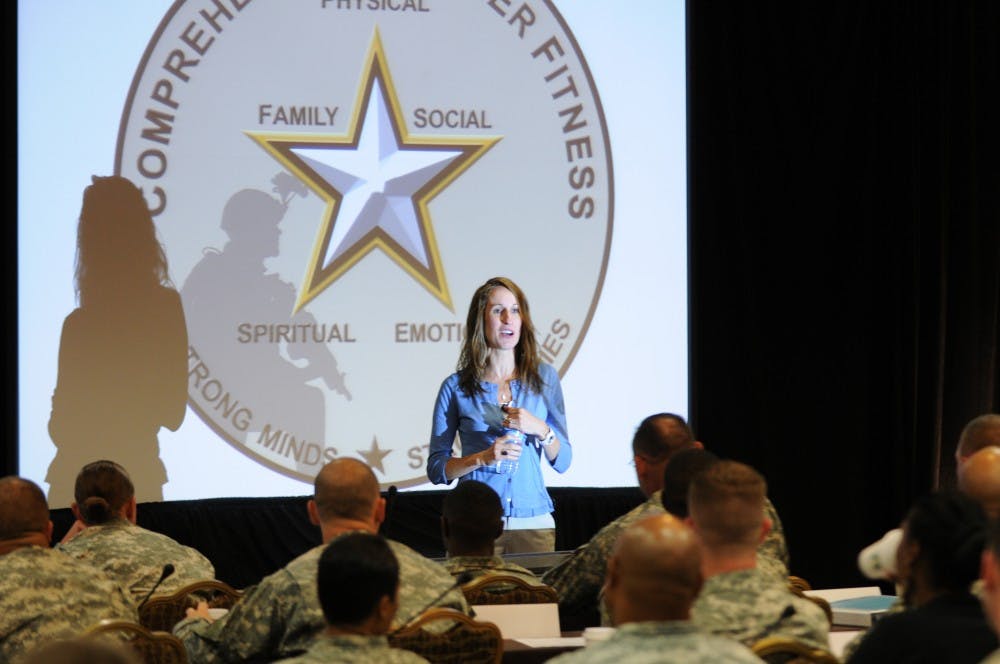The United States Army is witnessing a major transformation, and the Penn Positive Psychology Center is playing an important part.
In 2009, Penn professors began developing a program for the army that addresses the psychological needs of soldiers. Called the Comprehensive Soldier Family and Fitness program, it was created in response to the increased demands on soldiers and their families because of long, repeated deployments in Afghanistan and Iraq.
“Comprehensive Soldier Fitness is a cultural change for the army in which they’re serious about human beings doing better,” Director of the Positive Psychology Center Martin Seligman said.
Penn professors began developing the program with the army because of the alarming rates of suicide and post-traumatic stress disorder, as well as a less obvious cause of stress for soldiers: their personal relationships which they must manage in real-time while on active duty.
“These are the first couple of wars in which every soldier has a cell phone,” Seligman said. “Very frequently you see things, like with PTSD and suicide, they have a fight with their girlfriend in Kansas City right before. It’s a question of how to get along with people you love. It’s really quite important for morale.”
For this reason, Seligman helped to create a four-step program to identify soldiers’ strengths and weaknesses, as well as to teach them and their families various skills for improving personal relationships.
One component of the process is the Master Resiliency Training program, which Penn has hosted over the past three years. MRT aims to train army officers to provide instruction on positive coaching to their subordinates.
Following an evaluation that took place in 2010 through 2011, the army officially recognized the MRT program as successful in January 2012.
8/12/12: Penn partners with Novartis to fight cancer
4/19/12: United States Military finances building of unmanned helicopters at SEAS
4/11/12: Michelle Obama and Jill Biden ‘Join Forces’ at Penn
Since it launched, the MRT program has been administered to officers by Karen Reivich, the co-director of the Penn Resiliency Project.
Prior to receiving requests from the army, the Penn Resiliency Project had been focused largely on researching student motivation.
Reivich said she “never in a million years” saw herself doing the work she is involved in today with the army.
“And it’s the most rewarding, meaningful, enjoyable and intense work I’ve ever done,” she said.
Over the years, Reivich has trained hundreds of army officers, most of whom were non-commissioned. Today, Reivich will be administering training to senior leaders of the army, including the vice chief of staff of the Army, as part of a suicide prevention event.
Reivich said she is “wildly honored to do this.”
“It shows that the most senior people in our military take the psychological fitness of our warriors as seriously as the physical fitness of our warriors,” she said.
Reivich added that the army has already begun administering resiliency training, and will take full control of executing training within the next few years.
“From the very beginning, the goal has been for Penn to train the army and to help the army become independent and self-sufficient in delivering resilience training to soldiers and their families,” Reivich said.
One officer who sat in Reivich’s classroom in 2011 is Master Sergeant Jennifer Loredo. Loredo recalled coming away from the MRT with a “strong set of skills that I could apply to my daily life and that I could teach to others.”
“I can’t tell you how many soldiers … have come back to me, literally with tears in their eyes, saying how much it changed them,” Loredo said.
Many of Loredo’s trainees have described a newfound ability to improve their personal relationships.
Loredo also noted that the training has the potential to become an all-encompassing part of soldiers’ lives.
“Hopefully, the end state is that everybody lives, breathes, eats and sleeps these skills and practices them all the time, and that it kind of becomes second nature,” she said. “It’s definitely a cultural change.”



